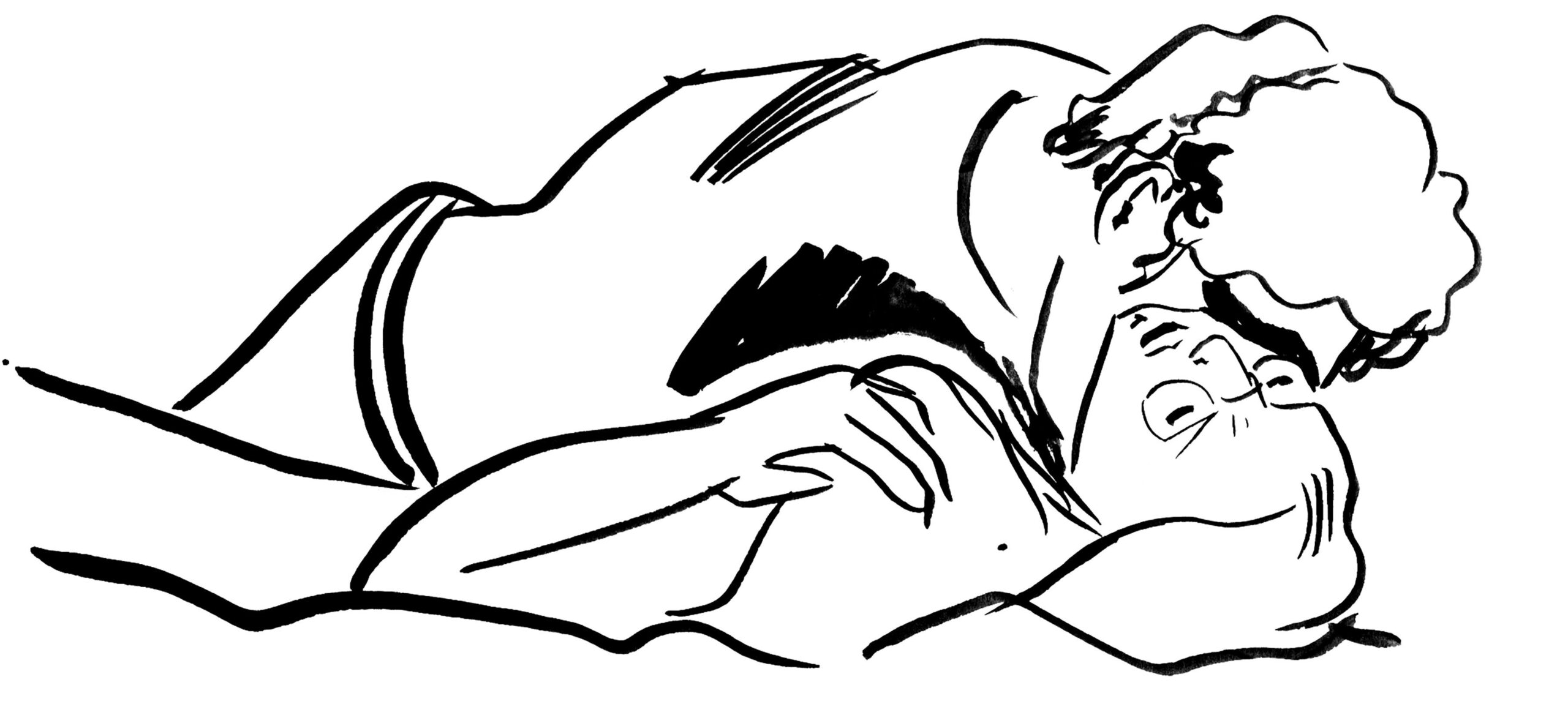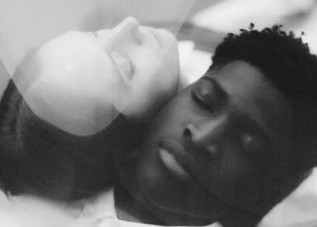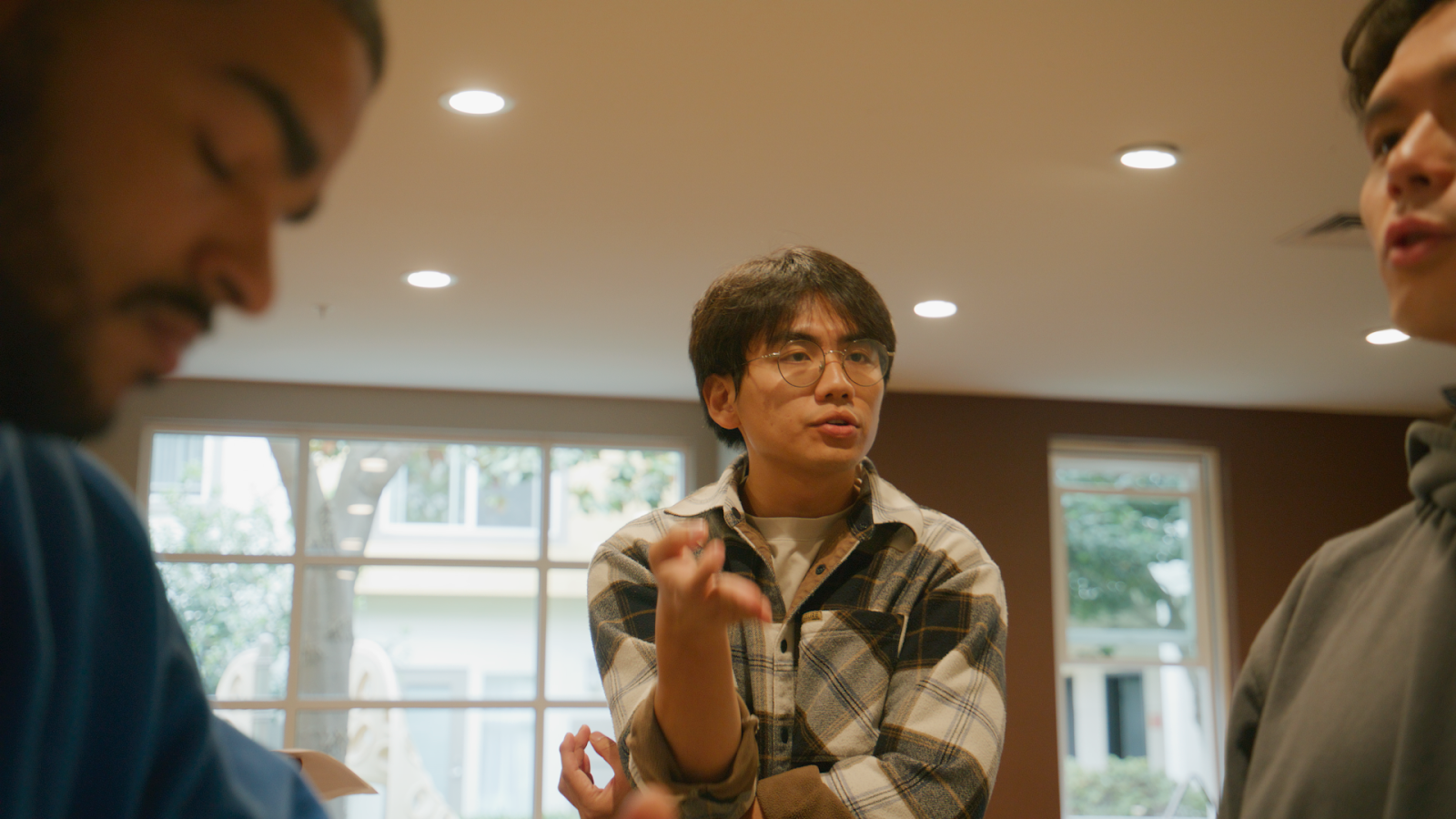
Sophie Lucido Johnson, from "Many Love."
Let’s talk about threesomes—but with your mom.
Recently, Jada Pinkett Smith teased an upcoming episode of her Facebook Watch series, Red Table Talk, in which she adds polyamory and open-relationships to the list of “taboo” topics discussed by three generations of women (herself, her mother, and her daughter, Willow.) In an interview with Jimmy Kimmel, Pinkett Smith described inviting a “throuple” on the show—two women and a man who are open about their shared intimacy on social media. “It’s a throuple that Willow was actually following on Instagram,” Pinkett Smith said. “That’s how it all came to be. She became very curious about this whole polyamory thing.”
Whether you call that type of relationship a “throuple” or a “triad,” the “poly” communities on social media sites like Instagram are taking steps toward normalizing non-monogamous relationships. The structures of which can include children and life-long commitments just as well as any other type of relationship. On YouTube, Stevie Boebi is the “creator and host of the first ever Lesbian Sex Ed video series for some reason.” In addition to providing detailed guidance for safe lesbian sex, Stevie openly identifies as polyamorous and discusses the differences between open relationships and polyamory—because for most people, the difference is still confusing.
As Stevie defines it, the difference is that she is capable of loving more than one person at a time; that doesn’t mean she’s always involved in open relationships (she’s single, by the way), nor does it mean that everyone in an open relationship is polyamorous. Depending on the individual, an open relationship may prioritize one primary partnership with an agreement to explore emotional and/or sexual connections with others. Alternatively, there may be no hierarchy of relationships, and all those involved are aware that their connections are not exclusive.
So not all forms of non-monogamy are necessarily polyamorous, and not all polyamorous people engage in non-monogamy. Shit, what?
One reason it’s common to conflate the two is that the terms have been defined differently among various circles. The first use of “polyamory,” according to the Oxford English Dictionary, isn’t even recorded until 1992. Today, the definition stands as: “The fact of having simultaneous close emotional relationships with two or more other individuals, viewed as an alternative to monogamy, esp. in regard to matters of sexual fidelity; the custom or practice of engaging in multiple sexual relationships with the knowledge and consent of all partners concerned.”
Or, according to outspoken comedian and LGBTQ+ activist, Margaret Cho, “Polyamory is really about negotiation with everybody that you may have intimacy with. It’s really about honesty and trust. It’s a very great thing to want to open up your love life, open up your life in a polyamorous way. But it’s also something you really need to be mature about.”
Cho’s definition echoes one of the first texts demystifying polyamory and, most importantly, defending it from deep-seated stigma in a historically heterosexual and monogamous society. In 1997, sex educator Janet W. Hardy and family therapist Dorothy Easton published The Ethical Slut: A Guide to Infinite Sexual Possibilities, in which they reclaim the term “slut” to positively connote open expression of one’s sexuality. They recount that “polyamory” simply means “loving many,” and “this word has been adopted by many sluts to describe their lifestyles, often abbreviated as ‘poly,’ as in ‘I am a poly person.’ Some use it to mean multiple committed live-in relationships, forms of group marriage; others use it as an umbrella word to cover all forms of sex and love, and domesticity outside conventional monogamy. Polyamory has moved into the language so rapidly that we think maybe the language has been waiting for it for a very long time.”
Specifically, the main source of confusion is whether or not polyamory is its own sexual orientation. The question is hotly debated even within the LGBTQ+ community, which has historically lacked representation and even misconstrued the polyamorous community. Youtuber Stevie and many triads on Instagram openly identify their sexual orientation as poly because they feel they’re born with the capacity to love more than one person at a time; being poly isn’t a choice. In contrast, popular LGBTQ+ writer Dan Savage argued in 2012 that polyamory is “not a sexual orientation. It’s not something you are, it’s something you do.” The problem, of course, is when that kind of resistant attitude drives discrimination against the poly community. Today, people lose jobs, custody of their children, or experience ostracism due to their personal sexual behavior. Isn’t that an experience shared with other queer orientations? In that case, why wouldn’t polyamory count as a sexual orientation?
Legal scholar Ann E. Tweedy even published a vehement argument that polyamory should be a protected sexual orientation—but with the caveat that our modern understanding of sexual orientation is inherently flawed. She writes, “Despite the fact that many LGB[TQ] people have themselves embraced the idea of an essential queer identity, the concept as currently constructed is problematic in several ways for LGB[TQ] people and others. Given the scope of these problems, it may ultimately be beneficial to LGB[TQ] people to move beyond the current, narrow view of sexual orientation and establish a more holistic notion.” Her point focuses on the fact that polyamory is “sufficiently embedded” in people’s lives to the point that it constitutes an identity that incurs discrimination.
Lastly, let’s not ignore the fact that much of the public’s misunderstandings of polyamory come from its gossipy relations to celebrities’ love lives. In particular, Jada Pinkett Smith’s marriage to Will Smith has been long-rumored to be an open relationship. She once commented, “I always told Will, ‘You can do whatever you want as long as you can look at yourself in the mirror and be OK.'” Afterwards, public scrutiny turned her suggestion of non-monogamy into a scandal. Pinkett Smith provided a lengthy clarification and, in doing so, corrected the flawed perception that non-monogamy is in any way prurient.
“The statement I made in regard to, ‘Will can do whatever he wants,’ has illuminated the need to discuss the relationship between trust and love and how they co-exist,” she wrote. “Do we believe loving someone means owning them? Do we believe that ownership is the reason someone should ‘behave’?…Do we believe that we can have meaningful relationships with people who have not defined nor live by the integrity of his or her higher self? What of unconditional love? Or does love look like, feel like, and operate as enslavement? Do we believe that the more control we put on someone the safer we are? What of TRUST and LOVE?”
Pinkett Smith continued, “Should we be married to individuals who can not be responsible for themselves and their families within their freedom? Should we be in relationships with individuals who we can not entrust to their own values, integrity, and LOVE…for us??? Here is how I will change my statement…Will and I BOTH can do WHATEVER we want, because we TRUST each other to do so. This does NOT mean we have an open relationship…this means we have a GROWN one.”
By and large, we as a society forget that sexual behavior is not the same as sexual orientation. When it comes to sexual relationships, intent is almost as important as consent. So, no, an occasional threesome does not automatically make a relationship polyamorous. And since sexual behavior does not necessarily reflect orientation (for instance, a lesbian can have heterosexual sex but not experience sexual attraction to a man), having an open relationship does not by itself mean one is polyamorous. So, in the midst of Pride month, let’s remember the identities that are stuck in the periphery of both mainstream heteronormativity and the LGBTQ+ community.
This Pride, let’s live by what Eason and Hardy wrote: “So who is an ethical slut? We are. Many, many others are. Maybe you are too. If you dream of freedom, if you dream of sex, if you dream of an abundance of friends and flirtation and consensual conquest, of following your desires and seeing where they take you, you’ve already taken the first step.”
- Six Songs about Fluid Sexuality More Outrageous than Ariana … ›
- Janet May Finds Harmony in Music and Activism – Popdust ›
- A Beginner’s Guide to “Red Table Talk” – Popdust ›
- Is straight cisgender polyamory part of LGBTQ? – Quora ›
- What does polyamorous mean? Should you give polyamory a go … ›
- The LGBTQ+ community needs to talk about polyamory ›
- Who Really Practices Polyamory? – Rolling Stone ›
- Ending the Stigma Around Polyamory — MY LGBT PLUS ›
- Polyamory – UCLA LGBTQ Resource Center ›
- Why People Are Fighting to Get Polyamory Recognized as a Sexual … ›
- Poly-Baiting: Why We Need a More Inclusive LGBT Movement … ›













